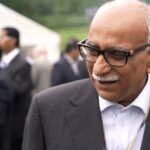This article is an on-site version of our FirstFT newsletter. Subscribers can sign up to our Asia, Europe/Africa or Americas edition to get the newsletter delivered every weekday morning. Explore all of our newsletters here
Good morning. Today we’re covering:
-
Pakistan’s army arrests former spymaster
-
The low-tax countries wooing the world’s wealthy
-
The IM Pei exhibition in Hong Kong
But we start with an exclusive story on US-China relations. The Pentagon has decided to remove Hesai from its blacklist of Chinese military-affiliated companies after judging that it did not meet the legal criteria for inclusion, according to several people familiar with the move.
The removal of the world’s biggest maker of laser sensors for electric vehicles is in an embarrassing reversal for the defence department, which added it to the list in January.
Congress passed legislation in 2021 requiring the Pentagon to compile the list. It was designed to increase scrutiny of Chinese groups operating in the US that are allegedly helping China modernise the People’s Liberation Army through what is known as the “military-civil fusion” programme.
Hesai, which is based in Shanghai and listed on Nasdaq, in May sued the Pentagon, saying there was no evidence it was connected to the PLA and calling the move “arbitrary and capricious”.
The Pentagon said it could not comment on Hesai because of the ongoing litigation. The White House did not comment. Hesai said the blacklisting was a “mistake”.
But James Mulvenon, an expert on the Chinese military and chief intelligence officer at Pamir Consulting, said Congress would probably update the 2021 law in a way that would allow the Pentagon to put Hesai back on the blacklist. Read the full story.
Here’s what else I’m keeping tabs on today:
-
Economic data: Singapore reports second-quarter growth and balance of payments data.
-
Reports: The IEA publishes its August oil market report.
-
Donald Trump-Elon Musk interview: The Republican presidential candidate is set to be interviewed by the X owner, just hours after he rejoined the social media platform that had once banned him.
Five more top stories
1. Pakistan’s army has arrested the former director of its powerful spy agency, Faiz Hameed, and has begun proceedings against him. Hameed is the first-ever spymaster to face a court martial in Pakistan’s 77-year history. Here’s what analysts made of the arrest.
2. Indian billionaire Sunil Bharti Mittal’s conglomerate has agreed to buy a 24.5 per cent stake in BT Group from Patrick Drahi’s Altice. Bharti Enterprises said yesterday that its international investment arm would buy 10 per cent of BT’s shares from Altice immediately and purchase the remainder after it had secured the necessary regulatory approvals.
3. Bangladesh’s new interim leader Muhammad Yunus has said the country must reform its judiciary and ensure freedom of speech in order to fix the “complete mess” left by toppled prime minister Sheikh Hasina. “The monster is gone,” Yunus told foreign journalists in a briefing in the Bangladeshi capital Dhaka.
4. The US yesterday warned that Iran or its proxies could launch an attack on Israel this week in retaliation for the assassinations of Hamas and Hizbollah leaders. The White House said it was preparing for “what could be a significant set of attacks” in its most specific public assessment of the timing of a potential assault from Tehran.
5. Russia said it had evacuated more than 133,000 people from border areas yesterday as Ukraine pressed on with its surprise incursion. Kyiv claims it has now taken more than 1,000 sq km of territory in the first ground invasion of Russia since the second world war.
The Big Read

With countries such as the UK tightening tax rules for well-off foreigners, the world’s super-rich are restless — and it has never been so easy for them to relocate. As a result, the competition to attract wealthy people has intensified, with newer jurisdictions such as Dubai and Singapore muscling in on traditional territories such as Britain, Switzerland and Monaco. Here’s how low-tax countries are wooing the world’s wealthy.
We’re also reading . . .
-
Autocracies: From Venezuela to Bangladesh, authoritarians are not immune to a wave of anti-incumbency spreading across the world, writes Alex Russell
-
Post-Olympics blues: Sports stars open up about the pressures they face — and the “decompression” after high-profile events.
-
Chinese dairy market: Milk producers are shifting their focus in China from babies to adults, as the falling birth rate and intense competition force them to search for new areas of growth.
Chart of the day
A call to end Australia’s ban on nuclear power has pushed energy policy to the fore ahead of next year’s election. Opposition leader Peter Dutton wants to replace the country’s coal plants with nuclear power stations but critics, including Anthony Albanese’s Labor government, say the focus should remain on renewable energy.
Take a break from the news
From his striking addition to the National Gallery of Art in Washington DC to the controversial glass pyramid at the Louvre, the late IM Pei may have been the world’s first “starchitect”. Yet a huge exhibition in Hong Kong’s M+ museum does not entirely endorse this narrative about the Chinese-American architect, writes Edwin Heathcote.

Additional contributions from Harvey Nriapia and Tee Zhuo






